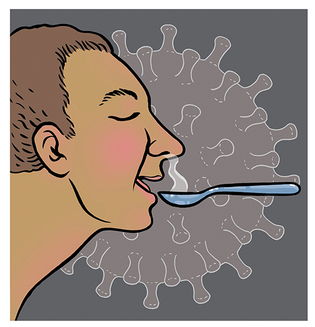
Gregory Nemec
Coffee that tastes like sewage, candles that smell like nothing at all—SARS-CoV-2 infection can warp people’s sense of smell or taste, sometimes indefinitely.
Joseph Vinetz ’85, professor of medicine at the Yale School of Medicine and an infectious disease specialist, saw this firsthand when treating patients. But when he launched a COVID-19 clinical trial in the late spring of 2020, minimizing these side effects wasn’t his main goal. Instead, he wanted to measure whether camostat mesylate, a drug used to treat pancreatitis, could treat COVID-19 by reducing the amount of SARS-CoV-2 virus.
In a preprint that has not yet been peer- reviewed, Vinetz’s team reported the unexpected results of a randomized, double-blinded clinical trial. Although the drug failed to reduce viral load, it potently defended against the troublesome loss of smell and taste.
“People really, really don’t like losing these senses,” says Vinetz. “It turns out that this was a very patient-oriented trial.”
Vinetz came across camostat mesylate as he pored through lab studies to find COVID-19 drug candidates that might help actual patients. One early study showed that the drug could run interference when the SARS-CoV-2 virus tried to infect a cell. The drug deactivated TMPRSS2, a key molecule that can usher the virus into human cells. Vinetz wanted to see if interfering with TMPRSS2 kept the virus under control in humans. But there was one main obstacle: he had never run a clinical trial before.
With the help of the Yale Center for Clinical Investigation, Vinetz launched the trial in just three months. In addition to measuring each patient’s viral load, he also recorded flu-like symptoms and loss of smell or taste, in case the drug made a difference—a lesson he had learned from the development of the influenza treatment Tamiflu. “It turns out that was a critical question to ask,” Vinetz notes.
The study was halted after recruiting 70 patients, because preliminary results showed no improvement in viral load. However, even in that limited group of participants, those who received camostat mesylate consistently retained the ability to smell or taste, while many people receiving the placebo lost these senses.
Vinetz is still not sure how the drug manages to preserve the senses, but his group is planning follow-up studies to figure it out. He’s especially curious about whether the drug might be particularly effective in certain types of cells near regions of the brain involved in smell and taste.
With more evidence, Vinetz thinks camostat mesylate might prove to be an important drug to give COVID-19 patients in combination with other virus-fighting drugs. The loss of two out of five of one’s basic senses can be demoralizing. “Especially as COVID-19 becomes an endemic disease,” he says, “we would like a medication that prevents this really greatly feared clinical outcome.”
 loading
loading